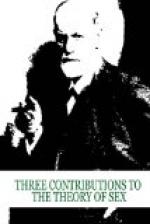Temporal Factors.—Just like prematurity, other factors, which under the designation of temporal can be added to prematurity, also demand consideration. It seems to be phylogenetically established in what sequence the individual impulsive feelings become active, and how long they can manifest themselves before they succumb to the influence of a newly appearing active impulse or to a typical repression. But both in this temporal succession as well as in the duration of the same, variations seem to occur, which must exercise a definite influence on the experience. It cannot be a matter of indifference whether a certain stream appears earlier or later than its counterstream, for the effect of a repression cannot be made retrogressive; a temporal deviation in the composition of the components regularly produces a change in the result. On the other hand impulsive feelings which appear with special intensity often come to a surprisingly rapid end, as in the case of the heterosexual attachment of the later manifest homosexuals. The strivings of childhood which manifest themselves most impetuously do not justify the fear that they will lastingly dominate the character of the grown-up; one has as much right to expect that they will disappear in order to make room for their counterparts. (Harsh masters do not rule long.) To what one may attribute such temporal confusions of the processes of development we are hardly able to suggest. A view is opened here to a deeper phalanx of biological, and perhaps also historical problems, which we have not yet approached within fighting distance.
Adhesion.—The significance of all premature sexual manifestations is enhanced by a psychic factor of unknown origin which at present can be put down only as a psychological preliminary. I believe that it is the heightened adhesion or fixedness of these impressions of the sexual life which in later neurotics, as well as in perverts, must be added for the completion of the other facts; for the same premature sexual manifestations in other persons cannot impress themselves deeply enough to repeat themselves compulsively and to succeed in prescribing the way for the sexual impulse throughout later life. Perhaps a part of the explanation for this adhesion lies in another




